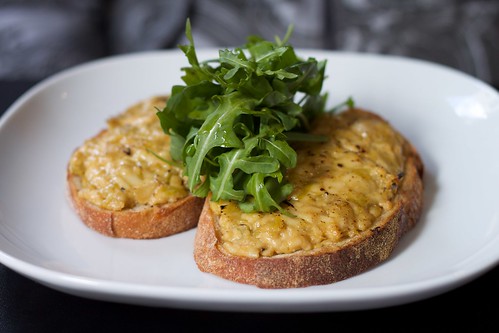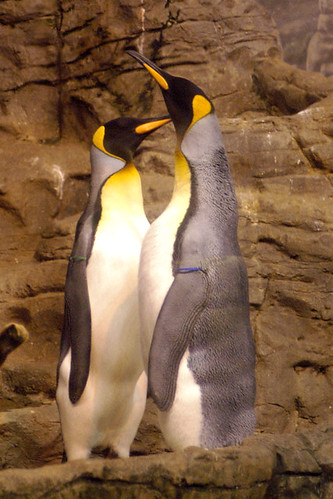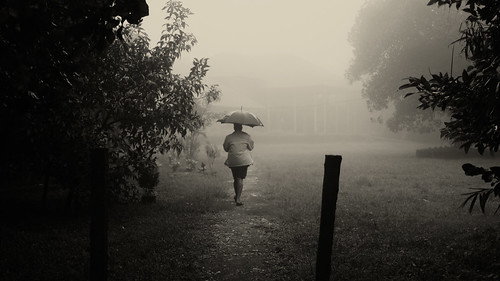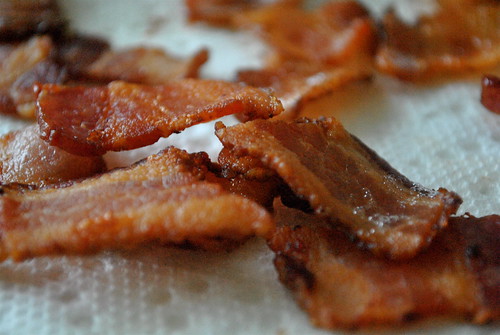
Happy National Welsh Rarebit Day!
In case you don’t know, rarebit, a corruption of the word rabbit, isn’t rabbit at all but “cheese melted with ale or beer served over toast.” If bunnies have nothing to do with this dish, how did it get its name?
The word Welsh was “used disparagingly of inferior or substitute things,” says the Online Etymology Dictionary. So cheese and bread is presumably a poor substitution for rabbit meat. Welsh was also used disparagingly to mean to swindle or cheat someone, and is now considered offensive.
Thinking about Welsh words inspired us to find some common English words with origins in Wales.
balderdash
“May only virgins wear white at their wedding? Baldridge says ‘Balderdash!’ ‘When it’s a first wedding, a bride has the right to pull out all the stops – even if she’s been living with her man for years and just left his bed that morning.'”
Maureen Early, “Times Change – From Doggie Bags to Living in Sin,” Ottawa Citizen, December 28, 1978
There are a few theories behind the origin of the word balderdash, meaning nonsense, one of which is that it comes from the Welsh baldordd, “idle noisy talk, chatter.”
What’s more certain is that the original definition was “a jumbled mixture of frothy liquors,” thought to refer to “the froth and foam made by barbers in dashing their balls backward and forward in hot water,” as per the Oxford English Dictionary (OED).
We honestly don’t know if balls here mean testicles or some olden day barber paraphernalia. If anyone knows, please enlighten us in the comments.
cardigan
“An army of 200 knitters from Cardigan have created a giant cardigan to mark the town’s 900th anniversary.”
“Cardigan’s close-knit community celebrates 900 years,” BBC, November 25, 2010
The cardigan sweater was named for the Seventh Earl of Cardigan, James Thomas Brudenell. The Earl, says the Online Etymology Dictionary, “set the style, in one account supposedly wearing such a jacket while leading the Charge of the Light Brigade at Balaclava.”
Cardigan is an anglicization of the Welsh Ceredigion, “Ceredig’s land.” Ceredig was an ancient Welsh king.

corgi
“Poppy, Anna, Alice, Oliver and Megan — five corgis who appeared alongside Helen Mirren in the film about Queen Elizabeth II — were named best historical hounds during a ceremony at London’s South Bank arts center Sunday.”
“Corgi stars from Queen take top Fido honor,” Houston Chronicle, November 2, 2007
It’s not surprising that the corgi, also known as the Welsh corgi, is Welsh in origin. The original Welsh, corci, translates as “dwarf dog.”
Another English word related to the Welsh cor is coracle, “a small rounded boat made of hides stretched over a wicker frame.” It comes from the Welsh corwgl, which may be translated as “small boat.”
flannel
“The new Administration is conservative. It’s buttondown, grey flannel, boardroom and locker-room. It’s businesslike – and dull.”
Anne Woodham, “A City of Grey Flannel Suits, Beaded Dresses,” The Sydney Morning Herald, January 26, 1969
The word flannel may come from the Welsh gwlanen, “woolen cloth.” This may be why Shakespeare used the word to ludicrously “designate a Welshman,” says the OED, in The Merry Wives of Windsor: “I am not able to answer the Welsh flannel.”
Other lesser known definitions of flannel include “a warming drink; hot gin and beer seasoned with nutmeg, sugar, etc.”; “a person of homely or uncouth dress, exterior, or manners”; nonsense or hot air; or insincere flattery or praise. A flannelmouth is an empty talker, a braggart or flatterer.
flummery
“Approaching Sylvia’s position and outlook from this level then, I thrust my way through what I impatiently dismissed as the ‘flummery‘; by which I meant the poetry, the picturesqueness, the sacrosanct glamour surrounding his Reverence and St. Jude’s.”
Alec John Dawson, The Message, 1907
The earliest meaning of flummery was “a sweet gelatinous pudding made by straining boiled oatmeal or flour,” and later also referred to “any of several soft, sweet, bland foods, such as custard,” says the OED. Its figurative meanings, deceptive language or humbug, and “trifles, useless trappings or ornaments,” came about in 1749 and 1879, respectively.
The word comes from the Welsh llymru, “soft jelly from sour oatmeal.”
pendragon
“The treacherous massacre alluded to is said to have been concerted by Gurtheryn (Vortigern), the British pendragon, (leader) who wished to obtain absolute power.”
“Ancient Dagger Found at Stonehenge,” The Mirror of Literature, Amusement, and Instruction, 1833
A pendragon is “a chief leader or a king; a head; a dictator; — a title assumed by the ancient British chiefs when called to lead other chiefs.” The word is now mainly known in the “Arthurian Uther Pendragon,” says the Online Etymology Dictionary. Uther Pendragon is the father of King Arthur and mentioned in Old Welsh poems.
The word pendragon is only half-Welsh. While pen comes from the Welsh word for “head,” dragon comes from the Latin draco, “large serpent.”

penguin
“Penguin pairs are known for their elaborate collaboration in raising chicks under harsh Antarctic conditions. But it turns out penguins will take teamwork only so far.”
Hadley Leggett, “Penguin Parents Won’t Chip in to Help Handicapped Spouse,” Wired, July 2, 2009
Penguin is our favorite word with a possibly Welsh origin. Like pendragon, it froms the Welsh pen, “head,” while –guin comes from the Welsh word for “white,” gwyn.
But wait, you might be saying, penguins don’t have white heads. According to World Wide Words, the word might have “first applied to the Great Auk, a flightless seabird now extinct which, like the penguin, used its wings to swim underwater.” It also kind of looks like a penguin. But the Great Auk apparently didn’t have a white head either. However, “it did have a white patch between the bill and the eye and this must have made it very visible.”
[Photo: “welsh rarebit,” CC BY 2.0 by Tristan Kenney]
[Photo: “Outside Corgi,” CC BY 2.0 by Austin White]
[Photo: “Penguins,” CC BY 2.0 by axinar]


![Hoyt's German Cologne perfumed with fragrant & lasting [front]](http://farm6.staticflickr.com/5483/9511082196_d13e4bc21e.jpg)



